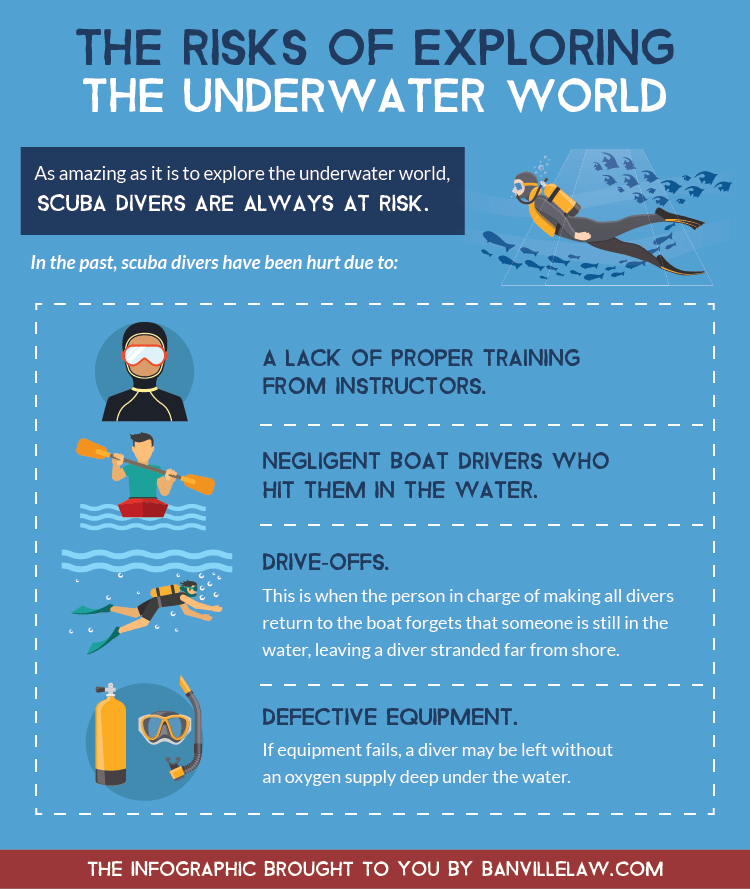The ocean’s depths have long held captive the imaginations of humans across the globe. Despite incredible advances in technology and hundreds of years of research and observation, the underwater world still holds many mysteries. For many, the best way to explore this strange and fascinating place it to scuba dive.
Although the idea of breathing underwater isn’t a new one, in the past, swimmers were limited to snorkeling or simply holding their breath while they dived as far as they could go until needing to come back to the surface. It wasn’t until the 1940’s that an engineer was able to create the first successful rebreather set. Then, humans were able to go deeper and stay underwater longer than ever before.
They also began to discover the dangers associated with scuba diving.
Continue reading more vacation-related accidents from our parasailing accident lawyers at Banville Law.
Today, depending on where the scuba diving excursion is taking place, the instructors and companies taking people out must meet certain safety requirements, create programs that are designed to allow participants to safely enjoy the underwater landscape, and maintain their scuba gear. If they fail to do so, accidents happen.
The most common accidents involve:
Any of these can inflict serious injury and illness on the participant.

Hundreds of divers every year sustain:
Whether it’s caused by sharp equipment, a sharp rock or ocean fixture, or from propellers while being hit by a boat, deep lacerations can cause life-threatening bleeding. In addition to this, the time that it takes to reach help while underwater can mean the difference between life and death.
This doesn’t factor in the fact that, depending on where the diving is taking place, underwater predators can actually smell blood in the water and may attack or the fact that these cuts are exposed to bacteria and foreign bodies that will flow in and out with the water.
Typically this is associated with an accident where a boat hits a diver floating at the surface. Boat propellers are sharp and powerful and can hurt animals as large as manatees and whales, so it’s hardly surprising that a human is no match.
If hit in the head by a boat or while exploring an underwater structure, head trauma can cause the diver to lose consciousness and drown or the effects of the trauma may not show until much later – when internal bleeding, swelling, and tissue damage causes serious issues that could potentially lead to a coma or death.
Everyone knows that millions of life forms exist under the water. Some are invisible to the naked eye and some are the largest creatures known to man. While many of these creatures don’t have any interest in harming man, some do, and some have defense systems that once triggered, can hurt and poison a person.
One thing that many don’t think about until they take their first lesson (if they are being properly instructed) is that there are pressure changes while underwater. Ear injuries are caused underwater through barotrauma – trauma caused by pressure changes. Medical conditions in the ear caused by driving include:
This condition is more commonly known as “the bends”. Basically, when changes in pressure occur too quickly, bubbles form inside of the body. So if a diver goes very deep under the water and fails to ascend at a slow pace, bubbles of nitrogen form in the body that can impact the joints, skin, heart, lungs, and brain.
Whatever the illness or injury, if the operator of the boat, the diving instructor, manufacturer of the diving equipment, or other party was negligent, the diver may be able to pursue legal action.
Frequently after being injured while scuba diving, the patient is left with extraordinary medical bills and if their injury was severe enough, unable to return to work to make money to pay for those bills.
The bottom line is, that if another party’s negligence caused their accident and injuries, they shouldn’t have to pay for the losses that stem from those injuries.
A personal injury lawsuit can be filed which seeks to provide the plaintiff with compensation that will cover their:
If the diver died from their injuries or illness, their loved ones can file a wrongful death lawsuit on their behalf. In addition to the above coverable losses, these claims can also cover loss of consortium, loss of inheritance, and funeral and burial expenses.
At Banville Law, we know that you are already under extreme stress. That’s why when you work with us, we work on a contingency fee basis. This means that we collect our fee, which will be discussed with you up front so there are no surprises, directly out of any compensation that you are awarded. That way you literally have nothing to lose because if you don’t obtain compensation, we don’t get paid.
Yes, going to trial is a possibility. However, this isn’t something that should stop you from consulting an attorney. From the moment you decide to work with us, we will prepare your case as though it is going to trial. But the fact is that most cases settle before anyone ever sets foot in court.
Continue reading: https://banvillelaw.com/vacation-travel-accident/theme-park/